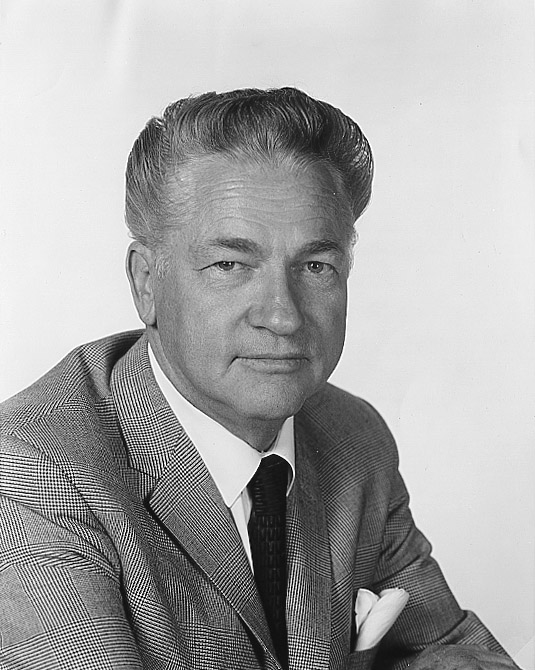
Elmo Williams
- TitleElmo Williams papers, 1960 - 1973 (inclusive)
- Collector
- Date(s)1960 - 1973 (inclusive)
1966 - 1971 (bulk) - Related names
- Description
7.2 linear ft. of papers
6.3 linear ft. of photos
16 item(s) of artworks1. Production files; 2. Television files; 3. Books; 4. Scrapbooks; 5. Photographs; 6. Graphic Arts
- Summary
The collection consists primarily consists of production material and photographs for some of the films Williams worked on while at 20th Century-Fox. The great majority of the material relates to TORA! TORA! TORA! (1970) and consists of treatments, scripts, script notes, correspondence, breakdowns, schedules, clippings, sketches, and a diary relating to this production. The photograph series consists of prints and negatives of motion picture production photographs.
- Scope notes
Special Collections
The Elmo Williams papers span the years 1960-1973 (bulk 1966-1971) and encompass 5 linear feet. The collection consists primarily of production material for some of the films Williams worked on while at 20th Century-Fox. The great majority of the material relates to TORA! TORA! TORA! (1970) and consists of treatments, scripts, script notes, correspondence, breakdowns, schedules, clippings, sketches, and a diary relating to this production. Of particular interest is the material regarding Akira Kurosawa's dismissal from the production, the personal recollections of Pearl Harbor survivors, and the correspondence with Darryl F. Zanuck. Material relating to other productions is limited primarily to cast and crew lists. There is no material on Williams's career as an editor or director, and almost no material relating to his personal life. - BiographyJames Elmo Williams (b. 1913) was born in Lone Wolf, Oklahoma, and orphaned at 16. He attended schools in Oklahoma and New Mexico before moving to Los Angeles. In 1933, while working as a carhop at a drive-in, he met film editor Merrill White and traveled to England as White's assistant. Over the next five years, Williams learned to edit and worked on a number of films, including SIXTY GLORIOUS YEARS (1938). After returning to Hollywood in 1939, White and Williams worked as associate producer and editor, respectively, on such films as NURSE EDITH CAVELL (1939), IRENE (1940), NO, NO, NANETTE (1940), and SUNNY (1941). During World War II Williams served as a civilian with the U.S. Army Signal Corps, and worked on training films for the Air Corps. After the war, Williams and Marston Fay edited a feature documentary, DESIGN FOR DEATH (1948), which received an Academy Award for best feature documentary.
Williams then entered television, working on such shows as HOPALONG CASSIDY, PACKARD BELL'S TELEVISION TALENT TEST, and BOZO THE CLOWN. During that period he and Linwood Dunn formed a company that made experimental films. Williams coedited HIGH NOON (1952), for which he received an Academy Award. He then began to direct as well as edit, starting with THE TALL TEXAN (1953). He produced, directed, edited, and photographed a documentary scripted by his wife, Lorraine, entitled THE COWBOY (1953). The following year he edited 20,000 LEAGUES UNDER THE SEA (1954), for which he received an Academy Award nomination. He then directed APACHE WARRIOR (1957) and codirected and edited HELL SHIP MUTINY (1957). After working as editorial supervisor and second unit director on the European production of THE VIKINGS (1958), he stayed in Europe and worked as a producer and director on the syndicated television series TALES OF THE VIKINGS.
In 1960 Williams began working for 20th Century-Fox, first as a second unit director in Africa for producer Darryl F. Zanuck on THE BIG GAMBLE (1961), then as associate producer and coordinator of battle episodes on THE LONGEST DAY (1962). He was then appointed managing director of European production for 20th Century-Fox and was based in London for the next four years. While there he executive produced such films as THE BLUE MAX (1966). In 1966 Williams returned to Hollywood to begin preproduction on TORA! TORA! TORA! the epic re-creation of the attack on Pearl Harbor, told from both the Japanese and American points of view. This project was Williams's major preoccupation for the next four years. Shortly after the film's release in 1970, an administrative shake-up at Fox resulted in the resignation of Richard Zanuck. Williams was named vice president in charge of worldwide production, a post he held until 1973, at which time he left to go into independent production. As an independent, he worked as a production executive for two companies, first for Iranian-backed Ibex Films, which produced CARAVANS (1978) and SIDEWINDER ONE (1977). He helped set up and run Gaylord Productions, which produced SOGGY BOTTOM, U.S.A (1981) and MAN, WOMAN AND CHILD (1983). In 1983 the Publicists Guild honored Williams for his 50 years of service in the motion picture industry. - Subjects
- Acquisitions InformationGift of Elmo Williams, 1980-1991.
- Preferred citationElmo Williams papers, Margaret Herrick Library, Academy of Motion Picture Arts and Sciences.
- DepartmentLibrary
- 120
- AvailabilityFor information on the contents and availability of this collection please contact the Reference and Public Services department at ref@oscars.org.
- Moving Image Items
- Library Holdings
